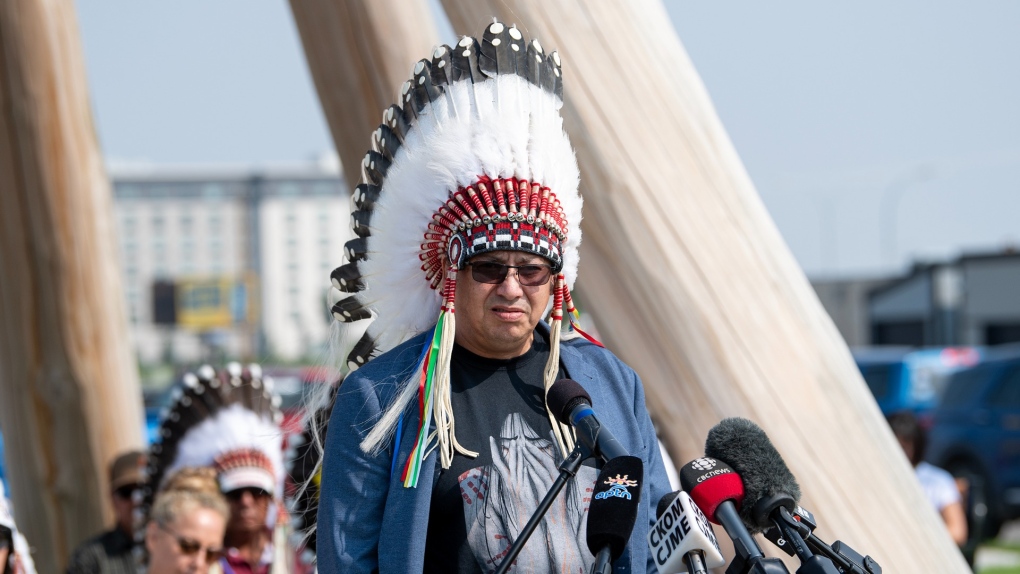The chief of Cold Lake First Nations says he plans to intervene in the provincial government’s court challenge of the federal Impact Assessment Act on the feds’ side.
This comes after a group of Treaty 6 First Nations in northern Alberta wrote to federal Environment and Climate Change Minister Steven Guilbeault requesting a federal impact assessment for a proposed multi-billion-dollar carbon storage network on their territory.
“We are federal people,” Chief Kelsey Jacko of Cold Lake First Nations told Alberta Native News. “We did not sign a Treaty with Alberta.”
The Supreme Court of Canada ruled in October 2023 that the federal Impact Assessment Act unconstitutionally steps into areas of provincial jurisdiction, which resulted in the federal government making amendments, including exempting greenhouse gas emissions from consideration.
Alberta Premier Daneille Smith, arguing that the changes amount to “clever word games,” is challenging the amended legislation at the Alberta Court of Appeal.
On Nov. 28, the same day Smith announced her latest court challenge, the leaders of Cold Lake First Nations, Beaver Lake Cree Nation, Frog Lake First Nations, Heart Lake First Nation, Kehewin Cree Nation, Onion Lake First Nation and Whitefish (Goodfish) Lake First Nation wrote a letter to Guilbeault asking for an impact assessment for the “massive and unprecedented project” proposed by the Pathways Alliance.
Pathways, which consists of the six largest producers in Alberta’s oil sands, is attempting to build a $16.5-billion 400-kilometre pipeline network that will transfer carbon dioxide captured from oil production to an underground storage hub outside Cold Lake, Alta.
The consortium filed its application for Alberta Energy Regulator (AER) approval in March.
Two months later, Athabasca Chipewyan First Nation and a group of environmental groups, including Environmental Defence Canada, Ecojustice and the Alberta Wilderness Association, applied to the AER for an environmental impact assessment, which was ultimately rejected.
In September, Chief Jacko told Alberta Native News he was concerned the project was “getting rubber stamped,” and that the alliance wasn’t consulting with impacted First Nations in any meaningful capacity.
In a recent interview, Jacko depicted the federal impact assessment as a measure of last resort.
“Our nations have been giving statements of concern for many years, and it just seems like they’re getting ignored,” he said.
 Cold Lake First Nations Chief Kelsey Jacko speaks during a media event in Saskatoon, Sask., on Tuesday, Aug. 29, 2023. (Liam Richards)
Cold Lake First Nations Chief Kelsey Jacko speaks during a media event in Saskatoon, Sask., on Tuesday, Aug. 29, 2023. (Liam Richards)
The letter to Guilbeault notes the “real risks of non-negligible adverse effects” if the Pathways project proceeds, citing potential adverse impacts on the “the health, social or economic conditions” of Indigenous Peoples, as well as environmental risks to Treaty lands and “interprovincial waters,” including the Athabasca watershed, North Saskatchewan River and Beaver River.
“These threats to our communities are highly concerning on their own; however, our concerns are intensified by the absence of any real regulatory review of these areas,” the letter reads.
Since 2010, there have been at least 76 reported safety incidents related to CO2 pipelines in the United States, according to data from the U.S. Department of Transportation.
A major safety concern is the above-ground impact of underground CO2 plume.
A rupture on a 12- to 14-inch diameter pipe can create a “kill zone of 760 feet” within one minute, according to a plume study from North Dakota.
Online news outlet The Narwhal revealed earlier this year that Pathways president Kendall Dilling wrote a letter to the federal government in 2023 requesting that the project be exempt from an impact assessment.
Guilbeault told Canada’s National Observer in August that ordering a federal impact assessment for a project is a decision made solely by the Impact Assessment Agency, which is outside his control.